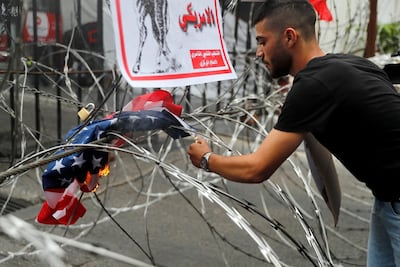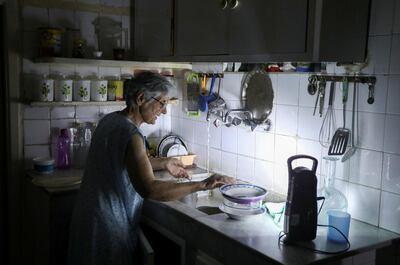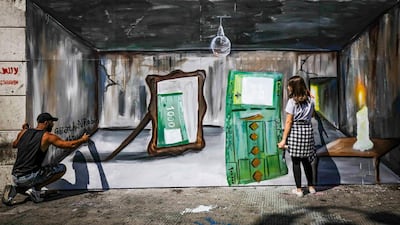While economists are warning that Lebanon is only weeks away from a total meltdown of its economic system, all signs indicate that Lebanese politicians and parties, and even the US, are calculating in a longer time-frame.
Until the US presidential election in November, Hezbollah, the dominant party in Lebanon, is unlikely to agree to the removal of the government of Prime Minister Hassan Diab. The party prefers to wait for the outcome of the election in order to decide what sort of government should replace it, even if it understands that Mr Diab has little margin to effect real change until that time.
Ironically, reports suggest that Washington is not in a very different frame of mind. American officials themselves are so uncertain about whether US President Donald Trump will win the re-election that they appear reluctant to push too hard on the Lebanese front. In part, they reportedly do not want to see a complete economic collapse of the country, with all the dangers that might ensue.
In this context, Lebanon continues to negotiate with the International Monetary Fund for a bailout that could help revive its finances. The talks have hardly progressed, however, because the Lebanese are themselves divided.
The government’s estimates of the losses of the central bank and the banking sector have been challenged by the central bank governor and representatives of the banking sector, who argue the figure is much lower.
There are many reasons why the banks want to downplay the losses. By underestimating them, banks hope to pay less to facilitate Lebanon's financial revival. In this they have the backing of leading politicians, who are not eager to lose a significant amount of their money in any imposed bail-in programme.
The banks and politicians form a powerful nexus, but their major disadvantage is that the IMF’s figures are much closer to those of the government.
The broader problem faced by the Diab government is more fundamental. The government has very little latitude to reform Lebanon’s finances and economy because it does not have the political backing to do so.
While the political class is well aware of the need to reach a deal with the IMF, without which the system over which they preside would collapse, they have certain conditions for this.
The first is that they view any IMF deal as a tool that must perpetuate their hold over the political system. The politicians realise that the Lebanese want such an agreement as a lifeline out of their current predicament, which is why the political class seeks to deliver it themselves and not allow the Diab government to do so.
Far from resisting an IMF deal, as some have speculated, they want to take advantage of it to revive their political power.

Second, an IMF deal is a mechanism that allows the politicians to leverage their economic advantages for individual political gain. For instance, a central issue that needs to be addressed in a reform programme is the highly wasteful and corrupt electricity sector.
The person who dominates this sector, Gebran Bassil, the head of the Free Patriotic Movement, hopes to succeed his father-in-law, Michel Aoun, as president. He is in an ideal position, therefore, to offer concessions in the electricity sector as a means of securing political support for his candidacy.

Similar calculations apply to everyone else as well. For the politicians, an IMF deal represents a key stage in the negotiations among themselves, and will help define how each of them emerges from Lebanon’s economic catastrophe. That is why what is holding up reform is not that the political class refuses to accept such a path, but that the politicians want to factor the diverse elements of their own political survival into any future agreement.
A third condition is also visible. The politicians don’t want to pay a heavy price for Lebanon’s revival. The banks’ dispute with the government over their losses was one dimension of this approach. But more generally, the politicians and parties in power want to shift the burden of any recovery on to the population.
Not only would this benefit them personally by reducing the bill they would have to pay for years of corruption; it would also allow them to manipulate popular dissatisfaction to their advantage, thereby enhancing their power.
Since last October, the main ambition of Lebanon’s leading politicians and parties has been to reassert their authority over a society that had rejected them as illegitimate during the uprising of October 2019.
This threat scared them, but they have steadily neutralised it by allowing the financial crisis to grow, and transforming the Diab government into a scapegoat for all Lebanon's ills. In that way, as mass suffering has risen, the politicians have presented themselves as the only ones capable of resolving Lebanon's problems.
For this process to come to fruition, for Hezbollah to feel comfortable in changing the Diab government, more time is needed, perhaps until the end of the year if the economy can last that long.
In the interim, the Lebanese will continue to face a terrible economic crisis, but also one in which the situation will remain manageable. The name of the game for Lebanon’s politicians is survival, not relief for their impoverished countrymen.
Michael Young is editor of Diwan, the blog of the Carnegie Middle East programme, in Beirut


